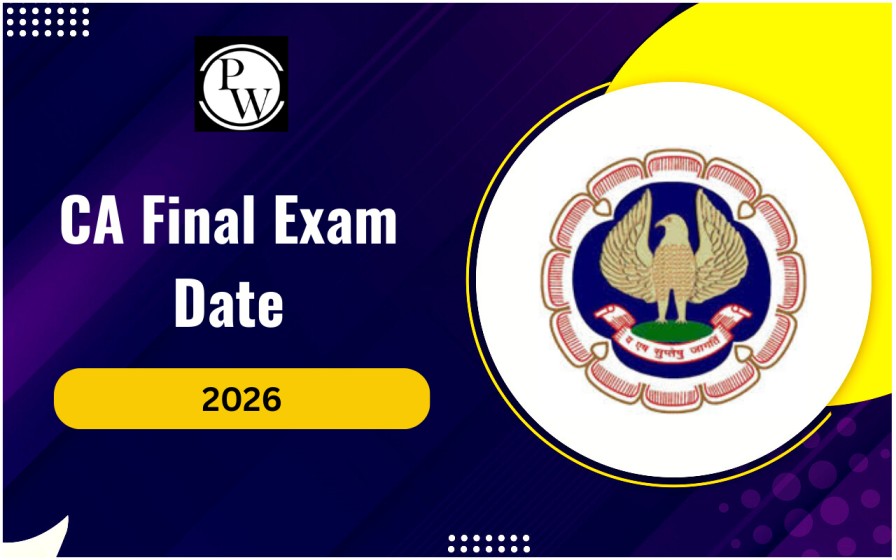
CA Final Amendments 2025: If students are preparing for the CA Final Sept 2025 syllabus, knowing the latest changes in law is very important. The ICAI updates the course to match changes made by the government in rules and acts. Below, we’ve mentioned the Companies Act Amendments and the Finance Act in simple language. We’ll also help the students to understand how these changes will affect the CA Final Amendments 2025 preparation.
Why CA Final Amendments 2025 Matter?
ICAI updates the Law related to companies and finance every year. These changes are important for students preparing for exams. If students are appearing for the CA Final Sept 2025, then students must know about the new topics added or removed. These changes are known as CA Final Amendments 2025. Without understanding these amendments, it will become difficult for students to score well.
Companies Act and Finance Act for CA Final Amendments 2025
Below, we’ve mentioned some key Companies Act Amendments and Finance Act Amendments for CA Final Amendments 2025:
Section 2(52): Defines a listed company as one with securities listed on any recognized stock exchange. Now, the Central Government (in consultation with SEBI) can specify classes of companies whose listed securities will not classify them as listed companies. This includes certain public and private companies with non-convertible debt securities or shares listed in foreign jurisdictions.
Section 8 (Formation of Companies with Charitable Objects): Imprisonment for defaulting directors or officers has been deleted. Only fines apply, ranging from ₹25,000 to ₹25,00,000 on the company or officers for non-compliance.
Section 16 (Rectification of Company Name): The time to change a similar name has been reduced from 6 months to 3 months. Fine provisions for non-compliance deleted. The Central Government can allot a new name and direct the ROC to issue a certificate accordingly.
Section 23 (Public Offer and Private Placement): New subsections allow issuance of securities for listing on permitted foreign stock exchanges, with possible exemptions from certain provisions of the Act for specified public companies.
Section 26 (Prospectus Requirements): Imprisonment removed. Persons knowingly involved in default may be fined between ₹50,000 to ₹3,00,000.
Section 40 (Securities Dealt with in Stock Exchange): Imprisonment removed; fine between ₹50,000 to ₹3,00,000 on the company or officers continues.
Section 48 (Variation of Shareholders' Rights): Fine and imprisonment provisions deleted for non-compliance.
Section 56 (Transfer and Transmission of Securities): Fines replaced by penalties:
- Company: Minimum penalty ₹50,000
- Officer: Minimum penalty ₹50,000
Previous fines ranged up to ₹5,00,000 for companies and ₹10,00,000 for officers.
Section 59 (Rectification of Register of Members): Provisions for fines and imprisonment for non-compliance deleted; section 59(5) repealed.
Section 62 (Further Issue of Share Capital): Minimum notice period for offer reduced from 15 days to 7 days (effective 1 April 2021).
Section 64 (Notice to ROC for Share Capital Alteration): Penalties reduced:
-
Company and officer penalty minimum ₹500/day, max varies (₹5,00,000 company, ₹1,00,000 officer).
Section 66 (Reduction of Share Capital): Fine on the company for non-publication of Tribunal order deleted; officer penalties and imprisonment under section 447 continue.
Section 68 (Company Purchase of Own Shares): Imprisonment of officers deleted; fines of ₹1 to ₹3 lakhs on the company and officers remain.
Section 71 (Debentures): Fines and imprisonment for defaulting officers removed.
Section 86 (Contravention of Registration of Charges): Imprisonment deleted; company penalty fixed at ₹5 lakhs and officer penalty at ₹50,000.
Section 88 (Register of Members): Fines replaced with penalties:
- Company: ₹3 lakhs
- Officer: ₹50,000
Further daily penalties are reduced accordingly.
Section 89 (Declaration of Beneficial Interest): Fines replaced by penalties; daily penalties capped at ₹200/day and max ₹5 lakhs. New power given to the Central Government to exempt persons from compliance in the public interest.
Section 90 (Register of Significant Beneficial Owners): Penalties reduced significantly from fines; company penalty ₹1 lakh plus continuation charges, officer penalty up to ₹25,000 plus daily penalties.
Section 92 (Annual Return): Penalty for late filing reduced from ₹50,000 to ₹10,000; continuing penalties also reduced. Penalties for a Company Secretary giving a wrong certificate increased to ₹2 lakhs from ₹50,000 fine.
Section 105 (Proxies): Penalty on officers reduced to ₹50,000 from ₹1 lakh fine.
Section 117 (Filing Resolutions/Agreements): Company penalty reduced to ₹10,000 from ₹1 lakh; continuing default penalties also sharply reduced. Officers' penalties are similarly reduced. Exemption extended to certain NBFCs and Housing Finance Companies.
Section 124 (Unpaid Dividends Account): Penalties have been significantly reduced. The company pays ₹1 lakh plus daily fines capped at ₹10 lakhs; officers pay ₹25,000 plus continuation penalties.
Section 128 (Books of Account): Imprisonment removed; fines from ₹50,000 to ₹5 lakhs continue on key officers.
Section 129A (Periodical Financial Results): A New section empowers the Central Government to mandate periodic financial results for certain unlisted companies similar to SEBI requirements for listed companies.
Section 134 (Financial Statements and Board Report): Imprisonment deleted; penalty on the company now ₹3 lakhs, officers pay ₹50,000 penalty.
Section 135 (Corporate Social Responsibility): Companies can set off excess CSR spend against future requirements. Imprisonment removed from penalties; company fined twice the unspent amount or ₹1 crore (whichever is less), officers fined 10% of the amount or ₹2 lakhs. If CSR spend ≤ ₹50 lakhs, no CSR committee required.
Section 137 (Filing Financial Statements with ROC): Penalties reduced to ₹10,000 with a daily cap of ₹2 lakhs for companies; officers have lower caps.
Section 140 (Auditor Removal and Notice): Maximum penalty reduced to ₹2 lakhs.
Section 143 (Auditors’ Powers and Duties): Penalty for default by auditors and professionals: ₹5 lakhs for listed, ₹1 lakh for others.
Section 147 (Contravention of Audit Provisions): Imprisonment deleted; fines unchanged up to ₹5 lakhs. Severe penalty with imprisonment retained for willful deception by an auditor.
Section 149 (Board of Directors/Independent Directors): Independent directors may be remunerated under Schedule V even if the company has no or inadequate profits.
Schedule V: Remuneration limits extended to other directors beyond managerial persons. More flexible limits are available with shareholders' resolution.
Section 165 (Number of Directorships): Penalty per day reduced to ₹2,000 (max ₹2 lakhs) from ₹5,000 per day.
Section 167 (Vacation of Office of Director): Imprisonment deleted; fine remains between ₹1 lakh to ₹5 lakhs.
Section 172 (Contravention of sections 149 to 171): Fine replaced by penalty ₹50,000, with continuing daily penalty capped at ₹3 lakhs (company) and ₹1 lakh (officer).
Section 178 (Nomination and Remuneration Committee): Imprisonment deleted; company penalty ₹5 lakhs and officer penalty ₹1 lakh.
Section 184 (Disclosure of Interest by Director): Imprisonment deleted; now a penalty of ₹1 lakh.
Section 187 (Investment in Company's Own Name): Officer imprisonment deleted; company and officer penalties reduced to ₹5 lakhs and ₹50,000 respectively.
Section 188 (Related Party Transactions): Imprisonment deleted; penalties increased to ₹25 lakhs for listed company officers and ₹5 lakhs for others.
Section 204 (Secretarial Audit): Penalty raised to ₹2 lakhs, no imprisonment.
Section 232 (Mergers & Amalgamations): Penalties reduced to ₹25,000 plus ₹1,000/day (max ₹3 lakhs); imprisonment deleted.
Section 242 (Powers of Tribunal): Imprisonment removed; fines retained.
Section 243 (Consequences of Termination/Modification of Agreements): Imprisonment deleted; fine of up to ₹5 lakhs retained.
Section 247 (Valuation by Registered Valuers): Fine increased to ₹50,000; imprisonment remains for fraud cases.
Section 284 (Cooperation with Company Liquidator): Imprisonment and fine deleted; Tribunal empowered to direct cooperation on application.
Section 302 (Company Dissolution by Tribunal): Liquidator fine deleted; Tribunal forwards dissolution order to ROC.
Section 342 (Prosecution of Delinquent Officers): Fine provisions deleted for failure to give assistance.
Section 347 (Disposal of Books and Papers): Imprisonment deleted; fines up to ₹50,000 retained.
Section 348 (Pending Liquidations): Imprisonment and fines have been replaced by Insolvency and Bankruptcy Code procedures.
Section 356 (Powers of Tribunal to Declare Dissolution Void): Fine deleted; Tribunal to forward order to ROC.
Sections 378A to 378ZU (Producer Companies): A New Chapter added with detailed provisions on incorporation, management, accounts, penalties, mergers, etc., largely modeled on the Companies Act, 1956.
Section 392 (Punishment for Contravention by Foreign Companies): Imprisonment removed; fines retained for companies and officers, daily fines for continuing defaults specified.
Section 393A (Exemptions under Chapter XXII): The Central Government is empowered to exempt classes of foreign companies from the provisions of sections 387–392.
Section 403 (Additional Fees for Filing): Higher additional fees may be prescribed after repeated defaults, but have not yet been notified.
Section 405 (Central Govt. Power to Demand Info): Imprisonment deleted; penalties fixed at ₹25,000 plus daily continuing penalties capped at ₹3 lakhs.
Section 441 (Compounding Offences): Imprisonment is replaced by maximum fines equal to twice the fine specified in the relevant section.
Section 446B (Lesser Penalties for Certain Companies): Concessions extended to one-person, Small, Start-up, and Producer companies. Penalties capped at 50% of normal penalties; max ₹2 lakhs (company) and ₹1 lakh (officer).
Section 450 (No Specific Penalty or Punishment Provided): Fines replaced by penalties of ₹10,000 plus daily penalty capped at ₹2 lakhs (company) and ₹50,000 (officer).
Section 452 (Wrongful Withholding of Property): The court shall not order imprisonment if the company has not paid relevant dues (PF, pension, compensation).
Section 454 (Adjudication of Penalties): An Adjudicating Officer can impose penalties to rectify defaults. If the Annual Return or Financial Statements default is rectified before notice, no penalty is imposed.
Fine v/s. Penalty
From some of the above amendments, it will be noticed that in some of the sections, the word “Fine” is replaced by the word “Penalty”. The distinction between these two terms is as under:
(i) The punishment for contravention of the relevant provisions by way of levy of fine on the company or by way of imprisonment and/or fine on any defaulting Officer of the company can be levied only by Special Courts as provided in sections 435 to 446B.
(ii) Section 454 provides that where any penalty is to be levied for contravention of any provision of the Act on the company or any officer of the company, it can be levied by the Adjudicating Officer appointed by the Central Government. By a Notification, some Registrars of Companies are appointed as Adjudicating Office₹ Appeal can be filed against
The penalty levied by such Adjudicating Officer before the Regional Director under section 454(5).
How to Prepare for CA Final Amendments 2025?
To help students, we’ve listed down how students can prepare for the CA Final Amendments 2025:
- Students should make a list of all changes under the Companies Act Amendments and the Finance Act.
- Students should regularly review the ICAI Updates regarding New Amendments.
- Watch the Revision videos and webinars by teachers that students understand the most.
- Practice more and more past year questions and sample papers that include new amendments.
- Students should prepare their own short notes to revise quickly.
Role of ICAI Updates in Exam Preparation
ICAI Updates give students all the latest information about changes in the syllabus. These updates help students stay updated. If students follow the ICAI Updates properly, they can easily understand the CA Final Amendments 2025. The ICAI also releases revision test papers and mock tests. These cover the Companies Act Amendments and updates under the Finance Act.
The CA Final Amendments 2025 are important for all students appearing in the upcoming exams. Whether it’s changes under the Companies Act Amendments or new tax rules from the Finance Act, students must study them well. These are also included in the CA Final Sept 2025 syllabus.
| Also Read: | |
| CA Final Exam Form | CA Final Exam Date |
| CA Final Registration | CA Final Admit Card |
| CA Final Eligibility Criteria | CA Final Syllabus |
CA Final Amendments 2025 FAQs
What are the CA Final Amendments 2025?
Where can I find the Companies Act amendments for CA Final?
Are the Finance Act changes also included in the CA Final Amendments 2025?
How often does ICAI release updates related to CA Final?
How should I study the CA Final Amendments 2025 effectively?










